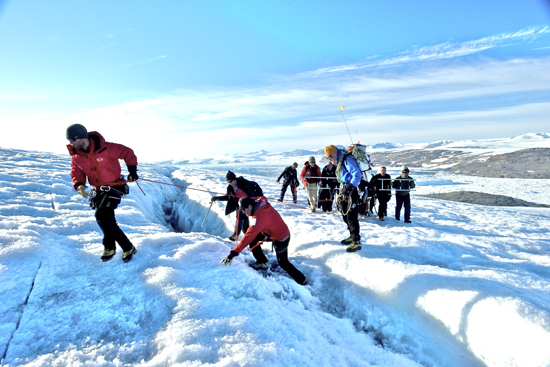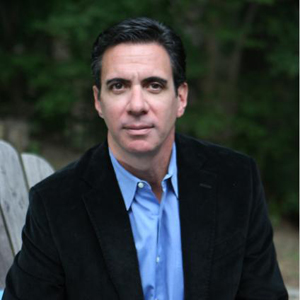Like his best-selling Lost in Shangri-La, Mitchell Zuckoff’s new book is a page-turning true story of heroism and survival on a remote front during World War II. Where Shangri-La tells the tale of a plane crash that left a group of U.S. servicemen and members of the Women’s Army Corps fending for themselves in the wilds of New Guinea, Frozen in Time, re-creates the events surrounding another, more tragic plane crash—in Greenland in 1942. After the crash, the surviving crew members withstood the arctic cold for 148 days as they huddled in the ripped fuselage, existing on supplies dropped by air onto ice riddled with lethal crevasses. Subtitled An Epic Story of Survival and a Modern Quest for Lost Heroes of World War II, the book chronicles one man’s modern obsession as well as the wartime resilience of others in a nail-biting narrative that reflects Zuckoff’s flair for unsparing historical detail.
Frozen in Time (Harper, 2013) is a contemporary story, too, with alternating chapters told in the first person, a departure for Zuckoff, a College of Communication professor of journalism. He became part of the story when he joined, and partially financed, an arctic expedition last summer hoping to locate the wreckage of the downed Grumman Duck and repatriate the frozen remains of the men who didn’t make it out alive. Inspired by a tenacious American adventurer named Lou Sapienza, the mission was a bit of a fiasco, but the colliding egos and daunting logistics enabled the author to lace the memoir-style chapters with observant, dry humor.
Bostonia spoke with Zuckoff about where he gets the ideas for his books and the perils of being part of the story.
Bostonia: You got the idea for this book by trolling through old newspaper clippings. Tell us about that.
Zuckoff: This is the newspaper nerd in me. It’s my idea of a good time. It’s distracting, it’s interesting, and it is almost always fruitful. I’m convinced that there are endless untold stories that maybe got a little bit of attention when they were happening, but if we look back at them now we realize, hey, that was something really remarkable. And so I feel like I’m panning for gold. And you have to pan for a really long time to get a nugget, but if you keep it up there’s no question that there’s gold in the stream.
How do you go about it?
I’ve been doing this for a really long time. I used to have to go over to the Boston Public Library microfilm room and bring out rolls and rolls. Now it’s so unbelievably easy. Through the BU library system, we have historic newspapers online, back to the 1800s. And you can do full word and text searching, so if you’re in the mood for rescue stories, you put in “rescue” and “war” and “arctic,” and you’re not going to believe the stuff that comes up. So I will spend hours and hours and sometimes I’ll get to a point where I’m almost free-associating, where I’m reading stories and it just leads to another idea that leads to another idea. And sometimes I’ll just read newspaper after newspaper for a particular time period just to immerse myself in that period.
So did you begin by choosing a target time period for the book?
For this one I did. After Lost in Shangri-La I wondered, could I find another World War II story that would intrigue me as much as Lost in Shangri-La did? When I found this, I actually hesitated at first because I didn’t want to replicate Lost in Shangri-La.
You didn’t want to write Lost in Shangri-La in a refrigerator.
Exactly. I never want to do the same thing twice. So I kind of played around with it; I started gathering string. I was looking at a few other ideas at the same time. And then I found Lou Sapienza. And when I realized there was a modern element to the story, I realized this has got to be the next book, because it’s different from Lost in Shangri-La. There’s a present-day element that makes it a completely different experience for me and hopefully for the reader.
In the historic story, there’s suspense, but practically no human conflict, yet there’s plenty of conflict in the contemporary story. Can you talk about that contrast?
In the historic story it was man versus nature. The level of self-sacrifice of all the men in 1942 and 1943, it’s genuine, it’s documented, and it’s mind-blowing, because every one of these guys put himself at risk for the guy next to him or the guys trapped on the ice, and every time they flew they knew they were flying into horrible conditions. And then, flash forward 70 years and we’re out on the ice and we have a heat unit in the big tent and we have plenty of food, and we’ve got bickering and turf battles and all these things. The only way I can help to explain it is that we weren’t fighting for our lives. They were. It was so elemental for the guys in ’42—there was no room for them to be worried about egos or pride or who was in charge. With us, we knew we were going to live. I think when the stakes are higher, the conflicts get lower, because you’re all fighting the same thing.

For his new book, Zuckoff joined an arctic expedition to find a plane downed in World War II.
Did the fact that you partially bankrolled the expedition affect the book?
I knew as I was writing it that I would have to make it clear to the reader what my role was in this and the fact that I was helping to fund the expedition. I figured transparency is the key. Beyond that, I don’t know if it colored it as much as that I was invested in it in all ways. I was just all in it and I felt like, okay this is so different for me because I’ve never done anything like this as a journalist—first of all involving myself in it. First person is completely new for me and certainly first wallet is completely new to me.
Was writing in the first person a challenge?
It went against 30 years of training. As journalists we are told, and I think it’s correct, that the story isn’t about you. I think there is a tremendous narcissism among some writers. When they go and interview someone famous, the first word in their story is “I.” The celebrity interview: “I walked into the Hollywood Hilton and I saw Brad Pitt across the way.” So you’ve got yourself twice before you’ve got Brad Pitt in there. I’ve always hated that. But here, it finally satisfied my own rules about first person: that leaving me out would’ve been more misleading and more detrimental to the story than putting me in. So I had no choice.
When you write about experiencing a plane crash or flying a plane, you put the reader right there in the cockpit. What does that process involve?
This is something I’ve been working on for a really long time. I wrote a story about a child with Down syndrome 15 years ago—it became my first book. Even then, I wanted readers to experience her heart surgery as if they were doing it, as though the scalpel was in their hand and they were opening her chest and they were patching this hole in her heart. It’s just layer upon layer in writing and getting closer and closer to the perspective. It’s a lot of rewriting, fixing and then changing your point of view, as a writer and a reader, and saying, I’m in the cockpit, I have the control wheel in my hands, what do I see? Reading it aloud is so key. If you read it aloud you will hear where the flaws are, where it doesn’t make sense.
You engage the other senses too, describing vibrations and the noises and smells the men would have experienced.
I talk to my students a lot about sensory reporting. I love smell. We all know this—there’s a smell that will bring you back to summer camp 50 years ago. It’s such a powerful sense and if you can tap into that as a writer, if there’s a bouquet of solvents inside the cockpit of a new plane, for somebody who knows that smell, I’ve got them right there.
Is that a big part of what you love about stories like these?
It is an endless feast. I was almost happiest when I was writing about the snow caves when they started to smell. Then I felt like I could put people in there. You can say it was really cold 100 times, but now waste is building up, these guys have not showered in four months. They smell. The food smells. Sometimes the cans of food would break when they were dropped from the planes and they would rot inside the cave. And they’re under this wing filled with fuel, so there are fumes. That’s when I know that I’m close enough that I’m really writing.
Those men were huddled in that frozen space for five long months. What were the challenges you encountered in conveying the passage of time?
First of all, you wouldn’t want, even if you had it, a day-by-day account. It would become monotonous. It would become unreadable. If somebody published a diary from this five-month period, I don’t think anyone would read it. It would sort of be like: “Woke up, it was cold. We tried to eat. The plane didn’t come over today. Next day.” But by having compilations of things like that and then writing in scenes and writing episodes, with high points, it keeps people coming back.
Have you ever flown a plane?
God, no.
Would you like to?
I keep writing about plane crashes, so I feel like I’m tempting fate. The closest I ever came was when I sat in the cockpit of a plane on the way in to Shangri-La. To balance the weight—it was a little tiny plane—the pilot said, “Well, you’re the biggest guy here other than me, so why don’t you sit in the copilot’s seat?” So I’m there and he said, “Take the stick.” And I was like, okay that’s enough. This is not for me. I’ll write about it and let the other guys fly it.
Your books reflect your deep admiration for pilots.
I feel as though these are men and women who take everyone’s lives in their hands with every move—you can’t take a second off. I just think what they do is incredible. And the fact is, for a lot of these people, they’re like 22 or 24 years old and they’re operating an enormously complex piece of machinery under horrible conditions and having to make split-second decisions, because suddenly they think the horizon is over there but, oh no, the horizon just disappeared. And they’re flying in basically the equivalent of a giant cotton ball and they don’t know their height over the land, they don’t know the height of the glacier that they’re heading toward, they’ve got their life and nine other lives banking on every decision. I think the world of these people.
Was your time in Greenland physically challenging?
Sure. But, it’s funny, I was so focused on the work, I really didn’t have time to think, wow I am so cold and I’m hungry and I’m exhausted and my muscles ache. You think about that afterward. But as it was happening, I wasn’t focused on that at all; I was really just focused on the stress of: what a mess. We’ve all invested; I’ve invested a lot of money, a lot of time. The whole end of the book is hinging on what happens in these days, and we can’t get out of our way. One day after another, this isn’t working, that’s not working.
Was your publisher highly invested in someone finding the Duck?
Extremely. I wouldn’t talk to my editor, because she was a little freaked out by the whole thing. I did make a couple of calls from the ice to my agent, who would relay the way things were going. For most of it, things were going terribly, so I said, “Don’t tell Claire, my editor, how badly things are going.”
Do you think you’ll go back?
If they’re going, I’m going. We’ve got to get the bodies, we’ve got to get the plane.
If that happens, will you update the book?
Yes. The plan is that if things go as we hope, there will be a new epilogue in the paperback.

















































Congratulations and best wishes to Mitchell on your story and efforts.
Your story reminds me of the 11-year efforts of another team to find the “Lost Squadron” in Greenland (a B-17 and 6 P-38 planes). They found and recovered a P-38 plane that had been buried 265 feet below the ice. The book and articles from those expeditions were most amazing to read and experience.
http://www.eppsaviation.com/about-us_the-lost-squadron.php